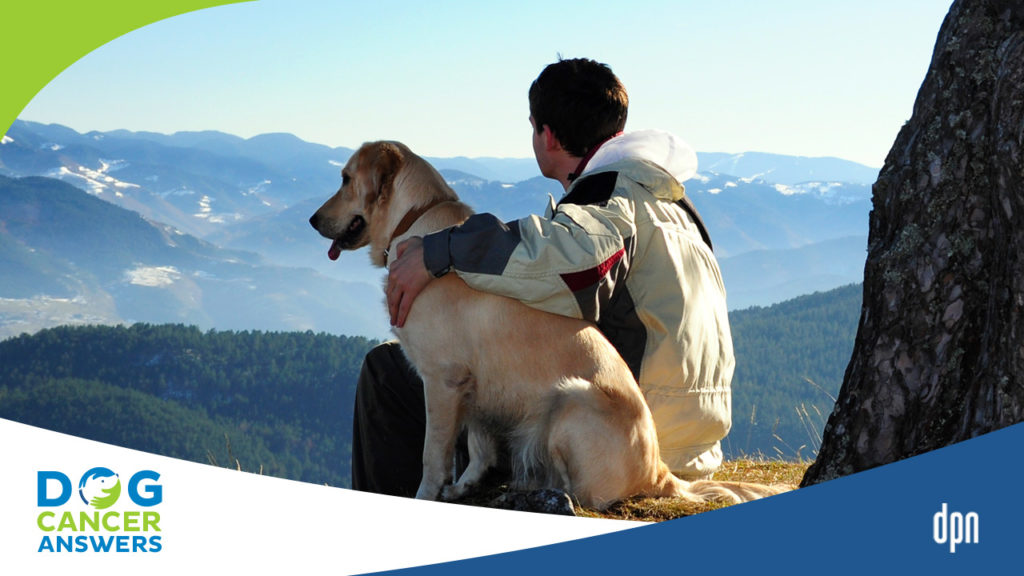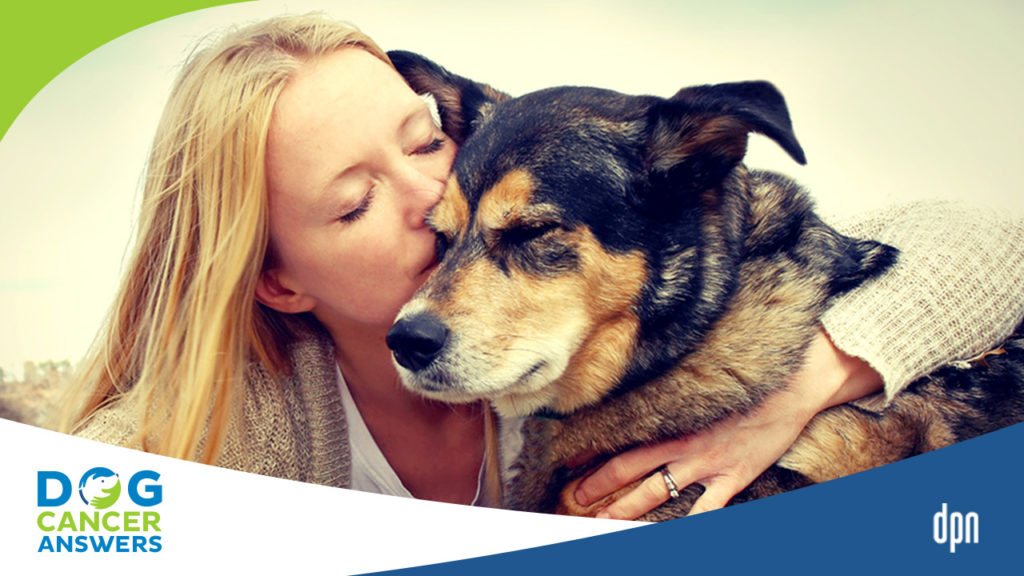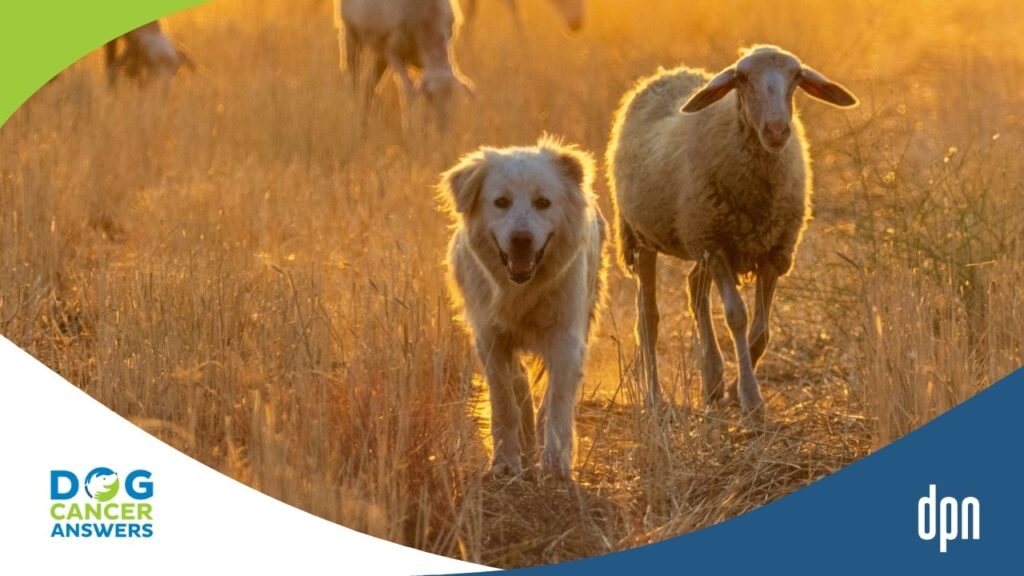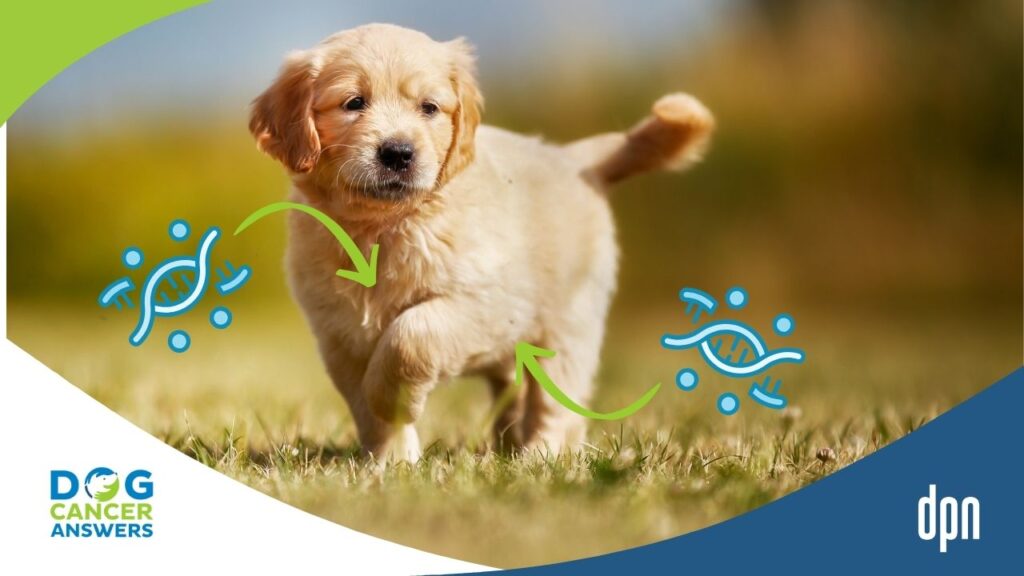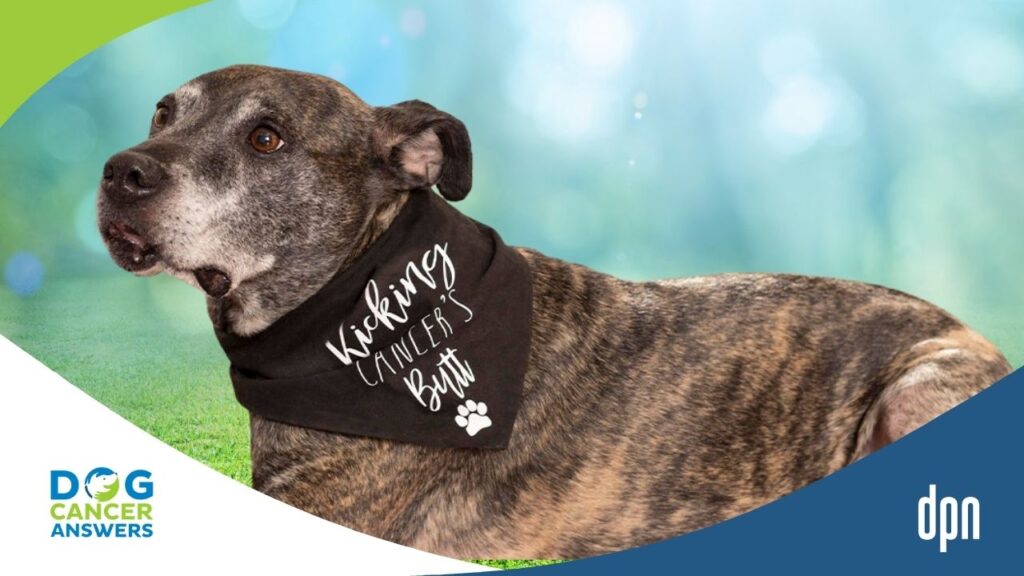EPISODE 132 | RELEASED September 27, 2021
How Type A for Action Treats Dog Cancer | Molly Jacobson Deep Dive
Type A for Action dog lovers pursue whatever treatments are available, and aim for longevity. If that sounds like you, this episode can help solidify your plans.
SHOW NOTES
When your dog is diagnosed with cancer, you have lots of information to process and lots of decisions to make. What is the prognosis? Can the tumor be removed with surgery? Will chemotherapy or radiation help to extend your dog’s life, and are they worth the cost, both financially, physically and emotionally? And how are you going to pay for this?
According to Dr. Demian Dressler’s Dog Cancer Coping Guide, dog lovers tend to fall into three personality categories when addressing these concerns and making treatment decisions:
- A for Action
- B for Balance
- C for Comfort
You have determined that you are a Type A. Type A owners want to take action. Let’s beat this thing, let’s do everything we can.
Molly Jacobson, editor of The Dog Cancer Survival Guide, joins us to help Type A’s make and execute plans.
[00:00:00] >> James Jacobson: Today’s show is sponsored by the Dog Cancer Survival Guide, the best-selling book that helps you help your dog with cancer. Join the companion private support group at DogCancerSupport.com and get the email newsletter at DogCancerNews.com.
[00:00:18] >> Molly Jacobson: I would really advise a Type A personality to have metrics, ’cause they tend to like metrics, they like measurements. So I would advise them to take really seriously Dr. Dressler’s recommendation to – he says somewhere in the beginning of the book, like, take a moment just to journal about your dog. What your dog likes, what a typical day is like for your dog. What are their favorite things to do, what are their joys of life, as he puts it. What are all the things that make your dog, not a dog, but your dog.
[00:00:51] >> Announcer: Welcome to Dog Cancer Answers, where we help you help your dog with cancer. Here’s your host, James Jacobson.
[00:00:59] >> James Jacobson: Hello, friend, and welcome to Dog Cancer Answers. So in our last episode, we explored whether you are a Type A, and a Type B, or a Type C personality, and how that impacts what you can do to help your dog with cancer.
In this episode, we are diving into people who are Type A, action people. Congratulations. If that is you, you’re an action person. And joining me to discuss this is my wife, Molly Jacobson. Molly, tell us a little bit about action people and specifically what kinds of treatment an action person would pursue.
[00:01:43] >> Molly Jacobson: So an action person would pursue any treatment that would help their dog to live a long time with as much life quality as possible. They would consider 100% of the options that their veterinarian lays out for them. They’d certainly be looking at all of the supplements that Dr. Dressler recommends.
They’re probably Googling more and going on to online forums and finding out the latest internet fad for treating cancer. And they are taking all of that and really laying it out. Like I know people who’ve made like spreadsheets. Um, these are the people who, when they find out, oh, a keto diet might help, they build a spreadsheet with all the algorithms in it so they can properly calculate the amount of turkey to give their dog tomorrow.
[00:02:31] >> James Jacobson: And then they go about sourcing it.
[00:02:33] >> Molly Jacobson: Right, exactly.
[00:02:34] >> James Jacobson: For the most organic.
[00:02:36] >> Molly Jacobson: Right. They try to hit as many points as possible and they try to do each one of those with as much… virility is a good word for it.
It’s like gusto. They really, really have a hard charging. And they’re often looking for second opinions, they’re often looking for third opinions-
[00:02:59] >> James Jacobson: Traveling long distances…
[00:03:00] >> Molly Jacobson: traveling long distances-
[00:03:01] >> James Jacobson: Not limited by geography.
[00:03:03] >> Molly Jacobson: Absolutely. These are the people who definitely like, you know, book a hotel room in the city where the oncologist is and drive the six hours and stay with their dog overnight in the hotel room so the dog can get a chemotherapy from a certain place. These are the people who will consider, like if their dog has lymphoma, they would be the ones who consider the bone marrow transplant that you can get at UC North Carolina.
[00:03:26] >> James Jacobson: Is there anything that a Type A would not do?
[00:03:29] >> Molly Jacobson: I think that type A’s, they wouldn’t do something they didn’t think was worth doing.
So this does not mean that they do everything, it means that they consider everything. They would-
[00:03:40] >> James Jacobson: Everything’s on the table.
[00:03:41] >> Molly Jacobson: Everything’s on the table. They eliminate things that are not going to do as much as they would like them to do, but everything is considered. So there are a lot of people who come to dog cancer and say, oh, I’d never do chemo, I’d never do radiation. That’s not a Type A. A Type A is going to consider it and then take into account all of the factors in their dog’s case. If it’s worthwhile, then they’ll try to find a way to do it. These are the people who will set up a GoFundMe for $10,000 and make sure that they reach out to every single person they’ve ever known, and join all the cancer support groups on Facebook so that they can, you know, send out their request for funding for their dog’s cancer. They are not shy about asking for help in funding this.
[00:04:30] >> James Jacobson: What situations really drive an action oriented guardian crazy?
[00:04:35] >> Molly Jacobson: Oh, when they feel like they’ve reached the end of their options. When they really feel like I’ve done everything I can do and there’s nothing, and nobody has any more ideas for me.
That’s where they really hit a wall in there. It’s very hard for them.
[00:04:49] >> James Jacobson: And if you are a Type A personality, how do you advise setting things up so they don’t go crazy in that way?
[00:04:57] >> Molly Jacobson: I would really advise a Type A personality to have metrics, ’cause they tend to like metrics. They like measurements. So I would advise them to take really seriously Dr. Dressler’s recommendation to – he says somewhere in the beginning of the book, like, take a moment just to journal about your dog, what your dog likes, what a typical day’s like for your dog, what are their favorite things to do. What are their joys of life, as he puts it. What are all the things that make your dog, not a dog, but your dog, you know? Every dog has a certain toy that they really love or a certain walk they really love, or they really hate this, or they love this kind of food.
Giving yourself a good portrait of your dog at the start of your cancer journey will then help you later when you’re hearing people say, well that didn’t work, or your dog failed out of that, or that’s not helping so we’re going to try something else oh, oh, we don’t have anything else to try. Then you can then turn to life quality and you can start to measure where’s my dog now, what is my dog look like now?
And you give yourself a new task to be action-oriented about so that you can switch from longevity to comfort care and to life quality so that the, that last bit where they don’t have, um, treatment options, they can still feel like they’re doing something. It’s really important to Type A’s to feel like they’re doing something for their dog.
[00:06:25] >> James Jacobson: So have those KPIs, to use a business term, set up and know what those metrics are.
[00:06:31] >> Molly Jacobson: Yeah. Know what those metrics are. ‘Cause for instance, maybe your dog is really worn out by the treatments, right? Like, they’re tired. The cancer’s making them tired and then they’re tired of chemo, they’re tired of radiation, they’re tired from surgery, they’re having a hard time. Things are breaking down and they’ve decided they don’t want to eat so much anymore. Well, now you can like focus on getting them to eat. You don’t have any more treatment options, let’s focus on having mealtimes be really super fun, and try new foods and try to, like, it’s things like that.
That’s just one example of the many ways that you could turn that action personality towards improving the life quality of your dog.
[00:07:13] >> James Jacobson: Any other coping tips for personality Type A?
[00:07:18] >> Molly Jacobson: I think it’s important for a Type A personality to sort of just ground down to themselves, if that, I don’t know if that’s exactly clear, but it’s like, I don’t want anybody to ever take this as a judgment ’cause it’s not. It’s just my observation after literally watching hundreds of thousands of people comment on the blog, be in our Facebook group, email us, talking to people on the phone, that a
[00:07:41] >> James Jacobson: Type-
And the Facebook group again is…?
[00:07:43] >> Molly Jacobson: Dog Cancer Support.
[00:07:44] >> James Jacobson: DogCancerSupport.com. We’ll give you a quick link to that Facebook group.
So after all these people…
[00:07:49] >> Molly Jacobson: What I find they really need to do is to sort of stop thinking about what’s out there for their dog. Not all the time, ’cause you always have to be looking, if you’re a Type A you’re always looking for the next thing to do. But routinely turning back inside, like within the four walls of your home, and looking your dog in the eye and making sure that you are really there and present with your dog, and that you’re not kind of out there just looking to save him, but you’re living with your dog. Because I think that’s a tendency that I’ve noticed, that sometimes they realize like it’s near the end and their regret, a Type A regret, is often: I wasn’t really present, especially at the end. They’ve, they were present-
[00:08:38] >> James Jacobson: I was so focused on the medical side that I wasn’t there to enjoy mealtime, or to give the dog extra hugs and love. And-
[00:08:44] >> Molly Jacobson: Yeah, or when they did do those things, they were doing them with purpose to treat the cancer, instead of truly enjoying, like really being there and being present. ‘Cause dogs, you know, they’re so sensitive and they’re so emotional, they can tell when we’re distracted. So I would just say that a Type A ideally will build in five, 10 minutes a day from the beginning where they’re not dealing with cancer, instead they are just being with their dog. And I think the more time during the day they can do that, the more check-ins they can do with themselves and with their dogs, that’s what I mean by ground down. It’s like just be present rather than always driving forward. And remember the reason to do that is because later when you look back, you don’t want to have those regrets. So if you want to put this in an action oriented frame of mind, how to appeal to that action person, I’d say to you, "The action you’re taking now of just being present to your dog and enjoying your dog is giving them their highest quality of life so that later, five, 10 years from now, when you look back, your memories aren’t going to just be of doing everything you could, which is good, which you will be proud of, but you’ll also be proud of yourself for having really been with your dog." Does that make sense?
[00:10:02] >> James Jacobson: It does.
[00:10:02] >> Molly Jacobson: Okay.
[00:10:02] >> James Jacobson: Let’s go in-depth a little bit more on the money side of things. In our intro to this series, we talked a little bit about Type A’s are generally the ones who spend more money because a lot of these treatments cost more money. But if you are a Type A, and you are an action person, and you want to do everything to keep your dog alive, because longevity, the number of days on this planet, are really important to the outcome.
And so many things are associated with opening your wallet and putting things on the credit card. What counsel do you have for people who may not be those billionaires, who have limited funds, but still want to have that action so they’d look back and don’t have regrets.
[00:10:48] >> Molly Jacobson: Well, the financial reality is that there’s, as you point out, there is a lot of money that can be spent on treating dog cancer.
The conventional treatments are all expensive. And it’s not just the treatments themselves. It’s all of the tests that you have to do in order to get the treatments, right? You have to draw blood every time you give chemo, you have to do the same for radiation, you have to do the same for surgery. There’s followup appointments, there’s-
[00:11:12] >> James Jacobson: Time away from work.
[00:11:13] >> Molly Jacobson: Time away from work, there’s travel time, there’s time away from possibly other things in your life that you could be doing. So there’s a lot of sacrifice. And then there’s all of the diet changes. You know, if you decide you’re going to home cook for your dog, that’s a lot of times, sometimes it’s a lot more money for some people who are used to feeding a commercial dog food.
So there’s a lot of money to spend on things. You can buy blackout blinds for your, like there’s there’s household items you can buy to improve the environment your dog lives in. There’s a ton of places where you’re going to be opening up your wallet. So, my feeling is that if you’re a Type A person and you’re really limited financially, then you’ve got to give yourself permission to be really pissed off about that.
You need to give yourself permission to feel really horrible, because it’s horrible. It’s horrible to have a dog with cancer, and it’s horrible to not be able to afford everything that you want to do, especially when you’ve got this Type A, action, drive inside that’s making you say, I want to do everything I can for my dog.
What you need to remember is that doing everything for your dog does not mean you love your dog more than if you don’t do everything for your dog. A lot of Type A’s equate taking action and doing all the things with how much they love their dog. And that is not necessarily how your dog’s going to experience love from you.
Right? So your dog obviously wants as much time with you as possible. That is totally undeniable. And your dog is not living in fear of dying and leaving you. So no matter how sick your dog gets or how close to the end your dog is, they’re not suffering from that feeling the way you are. And so to kind of mitigate your feelings about not having the financial resources, I would remind you to focus on the other things that are intangible, that your dog values much more than money.
And perhaps even to, to reframe things, like, okay, I can’t afford $10,000 for a chemotherapy protocol that my veterinarian oncologist wants me to use or suggests that would be the best course of action, so I’m going to just, I’m going to do this other option that’s less expensive, and I’m going to know that my dog is totally on board with that. Because ultimately my dog doesn’t care whether they get just pred or the full CHOP protocol.
[00:13:53] >> James Jacobson: Molly Jacobson, thank you. So hopefully Listener, you know you’re a Type A, you know what you’re doing, but if after listening to this you wonder, well, maybe I’m a Type B or a Type C, we have episodes in this series for you to listen to. And if you have questions, I want to encourage you to join us in our Dog Cancer Support group on Facebook. You can find that by doing a search in Facebook for Dog Cancer Support or even go to the short URL, DogCancerSupport.com, and that will redirect you straight to our group. And as always, I encourage you to subscribe to Dog Cancer News, which is a newsletter that comes out three times a week with really useful information. And you can find that at DogCancerNews.com. Molly Jacobson, thanks for being with us today, and thank you for tuning in and joining us.
[00:14:47] >> Molly Jacobson: Thank you.
[00:14:48] >> James Jacobson: On behalf of all of us here at Dog Podcast Network, I’m James Jacobson wishing you and your dog a very warm Aloha.
[00:15:01] >> Announcer: Thank you for listening to Dog Cancer Answers. If you’d like to connect, please visit our website at DogCancerAnswers.com or call our Listener Line at (808) 868-3200. And here’s a friendly reminder that you probably already know: this podcast is provided for informational and educational purposes only. It’s not meant to take the place of the advice you receive from your dog’s veterinarian. Only veterinarians who examine your dog can give you veterinary advice or diagnose your dog’s medical condition.
Your reliance on the information you hear on this podcast is solely at your own risk. If your dog has a specific health problem, contact your veterinarian. Also, please keep in mind that veterinary information can change rapidly. Therefore, some information may be out of date. Dog Cancer Answers is a presentation of Maui Media in association with Dog Podcast Network.
Hosted By
SUBSCRIBE ON YOUR FAVORITE PLATFORM
Topics
Editor's Picks
CATEGORY



